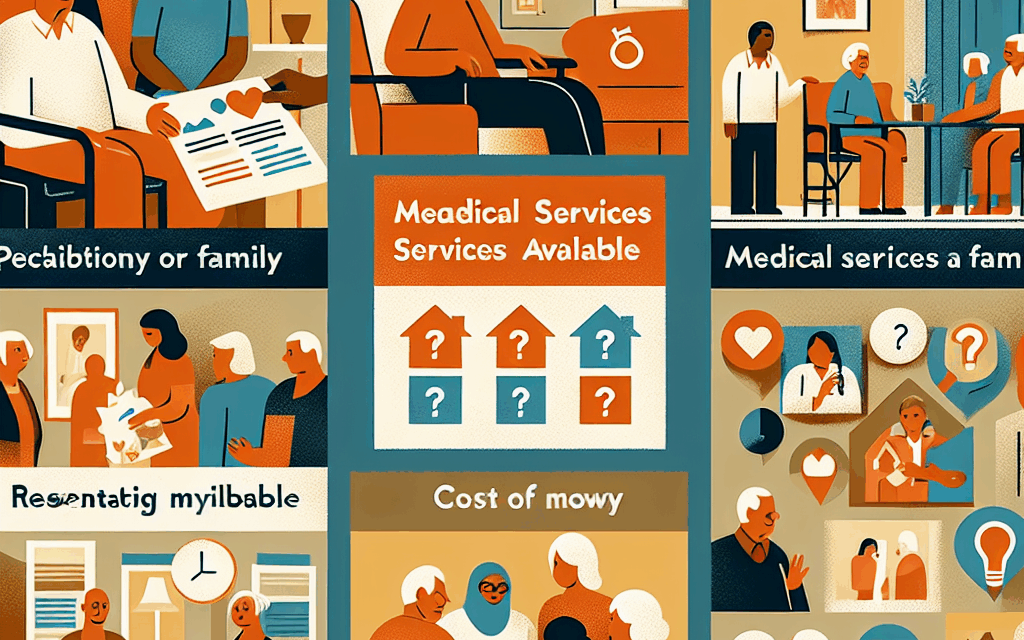Essential Questions for Families When Selecting Senior Housing
Choosing the right senior housing is a significant decision that can impact the quality of life for older adults and their families. With a variety of options available, from independent living to assisted living and nursing homes, families must navigate a complex landscape to find the best fit for their loved ones. This article will explore essential questions families should consider when selecting senior housing, providing insights and guidance to help make informed decisions.
Understanding the Types of Senior Housing
Before diving into specific questions, it’s crucial to understand the different types of senior housing available. Each option caters to varying levels of independence and care needs.
- Independent Living: Ideal for seniors who are largely self-sufficient but may benefit from community living and social activities.
- Assisted Living: Provides support with daily activities such as bathing, dressing, and medication management while allowing for a degree of independence.
- Nursing Homes: Designed for seniors who require 24-hour medical care and supervision, often due to chronic health conditions.
- Memory Care: Specialized facilities for individuals with Alzheimer’s disease or other forms of dementia, focusing on safety and cognitive support.
- Continuing Care Retirement Communities (CCRCs): Offer a continuum of care from independent living to skilled nursing, allowing residents to age in place.
Understanding these categories will help families frame their questions and identify the most suitable options for their loved ones.
1. What Are the Care Needs of Your Loved One?
The first step in selecting senior housing is assessing the specific care needs of the individual. This involves a comprehensive evaluation of their physical, emotional, and social requirements.
Families should consider the following:
- Medical Conditions: Does your loved one have chronic illnesses that require ongoing management? Conditions like diabetes, heart disease, or mobility issues may necessitate a higher level of care.
- Daily Living Activities: Can they perform daily tasks such as bathing, dressing, and cooking independently? If assistance is needed, how much support is required?
- Cognitive Function: Are there any cognitive impairments that affect decision-making or safety? This is particularly important for those considering memory care options.
- Social Needs: Does your loved one thrive in social settings, or do they prefer solitude? Understanding their social preferences can guide the choice of community.
For example, a case study involving a 78-year-old woman named Margaret illustrates this point. Margaret was diagnosed with early-stage Alzheimer’s disease but was still physically active. Her family initially considered independent living but ultimately opted for a memory care facility that offered social activities tailored to her cognitive abilities. This decision not only provided her with the necessary support but also enhanced her quality of life through social engagement.
Statistics show that nearly 70% of seniors will require some form of long-term care in their lifetime. Therefore, accurately assessing care needs is crucial for making the right choice.
2. What Is the Cost and Payment Structure?
Understanding the financial implications of senior housing is essential for families. Costs can vary significantly based on the type of facility, location, and level of care required.
Families should ask the following questions:
- What Are the Monthly Fees? Inquire about the base rate and what it includes. Some facilities may charge extra for additional services like transportation or personal care.
- Are There Any Upfront Costs? Some communities require a one-time entrance fee, especially CCRCs. Understanding these costs upfront can prevent financial surprises later.
- What Payment Options Are Available? Explore whether the facility accepts long-term care insurance, Medicaid, or other financial assistance programs.
- What Is the Refund Policy? In case your loved one needs to move out, it’s important to know if any portion of the fees is refundable.
For instance, a study by Genworth Financial revealed that the average monthly cost for assisted living in the U.S. is approximately $4,500, while nursing homes can exceed $8,000 per month. These figures highlight the importance of budgeting and understanding the financial landscape before making a commitment.
Additionally, families should consider the long-term financial implications. If a loved one’s health deteriorates, will the chosen facility be able to accommodate their changing needs without incurring exorbitant costs? This foresight can save families from financial strain in the future.
3. What Is the Facility’s Reputation and Quality of Care?
The reputation of a senior housing facility is a critical factor in ensuring quality care. Families should conduct thorough research to gauge the facility’s standing in the community.
Key questions to consider include:
- What Do Reviews and Ratings Say? Online reviews, testimonials, and ratings from organizations like the Centers for Medicare & Medicaid Services (CMS) can provide insights into the facility’s quality of care.
- What Is the Staff-to-Resident Ratio? A lower ratio often indicates more personalized care. Ask about the qualifications and training of the staff as well.
- Are There Any Recent Violations or Complaints? Investigate any past violations or complaints filed against the facility. This information can often be found through state health department websites.
- What Is the Facility’s Approach to Care? Understanding the facility’s philosophy on care, including how they handle emergencies and daily routines, can help families assess if it aligns with their loved one’s needs.
A case study involving a family’s experience with a nursing home highlights the importance of reputation. The Johnson family chose a facility based on a friend’s recommendation, only to discover numerous complaints about staff turnover and inadequate care. After a few months, they decided to move their father to a different facility with better reviews, resulting in improved health and happiness.
Statistics from the National Center for Assisted Living indicate that 90% of families report satisfaction with their loved one’s care when they choose a facility with a strong reputation. This underscores the importance of thorough research and due diligence.
4. What Amenities and Services Are Offered?
Amenities and services can significantly enhance the quality of life for seniors in housing facilities. Families should consider what is important for their loved one’s lifestyle and preferences.
Essential questions include:
- What Types of Activities Are Available? Look for facilities that offer a variety of social, recreational, and educational activities that align with your loved one’s interests.
- What Dining Options Are Provided? Inquire about meal plans, dietary accommodations, and whether residents have a say in menu choices.
- Are There Transportation Services? Access to transportation for medical appointments, shopping, and social outings can greatly enhance a resident’s independence.
- What Safety Features Are in Place? Safety is paramount. Ask about emergency response systems, security measures, and accessibility features within the facility.
For example, a facility that offers a robust calendar of activities, including exercise classes, art workshops, and outings, can help combat loneliness and promote mental well-being. A study published in the Journal of Aging Research found that seniors who engage in regular social activities experience lower rates of depression and cognitive decline.
Additionally, amenities such as fitness centers, gardens, and communal spaces can foster a sense of community and belonging, which is vital for emotional health. Families should prioritize facilities that align with their loved one’s lifestyle preferences to ensure a fulfilling living experience.
5. How Does the Facility Handle Transitions in Care?
As seniors age, their care needs may change. It’s essential for families to understand how a facility manages transitions in care to ensure continuity and quality of support.
Key questions to ask include:
- What Is the Process for Assessing Changing Needs? Inquire about how often residents’ care plans are reviewed and updated based on their evolving needs.
- Can Residents Transition to Higher Levels of Care Within the Same Facility? Understanding whether the facility can accommodate increased care needs without requiring a move can provide peace of mind.
- What Support Is Available for Families During Transitions? Families should know what resources and support systems are in place to help them navigate changes in care.
- How Are Emergencies Handled? Ask about the facility’s protocols for medical emergencies and how they communicate with families during such events.
A case study involving a couple, Tom and Linda, illustrates the importance of understanding transitions in care. Initially, they moved into an independent living community, but as Tom’s health declined, they were able to transition to assisted living within the same facility. This seamless transition allowed them to remain together and maintain their social connections, significantly improving their overall well-being.
According to a report by the National Institute on Aging, seniors who experience smooth transitions in care are less likely to face hospitalizations and have better health outcomes. This highlights the importance of selecting a facility that prioritizes continuity of care.
Conclusion
Choosing the right senior housing is a multifaceted decision that requires careful consideration of various factors. By asking essential questions about care needs, costs, reputation, amenities, and transitions in care, families can make informed choices that enhance their loved one’s quality of life.
As the population ages, the demand for senior housing will continue to grow. Families must be proactive in their research and decision-making processes to ensure that their loved ones receive the best possible care and support. By prioritizing the needs and preferences of seniors, families can find a housing solution that fosters independence, dignity, and happiness in their later years.
In summary, the journey to selecting senior housing may be complex, but with the right questions and thorough research, families can navigate this process with confidence, ensuring a positive living experience for their loved ones.





